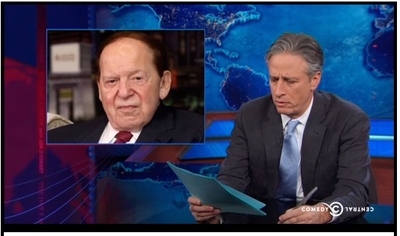Chris Christie and the "Occupied Territories" Incident
A small but significant event took place on March 29 at the Republican Jewish Coalition in Las Vegas. Hosted by Sheldon Adelson, the mega-donor to Republican presidential campaigns, the event drew four leading potential candidates for president in 2016, including New Jersey governor Chris Christie.
In the Q&A session, Christie recounted a trip he took with the RJC to Israel in 2012. In the course of a choppy sentence in which he expressed his admiration for the country, he used the term occupied territories to refer to the West Bank: "I took a helicopter ride from the occupied territories across, … and just felt, personally, how extraordinary that was, to understand the military risk that Israel faces every day."
New Jersey governor Chris Christie spoke at the Republican Jewish Coalition in Las Vegas March 29.
That term caused a stir in the audience. As Christie left the venue, Morton Klein, president of the Zionist Organization of America, confronted him in a hallway. "Governor Christie, you used an inaccurate and erroneous term." Klein tells me that he explained to Christie that the Kingdom of Jordan lacked recognized control of the territory and that Jews have greater rights to it than Arabs. He concluded by requesting that Christie not use "occupied territories" in the future but rather "Judea and Samaria," "West Bank," or "disputed territories."
Christie replied, "Yeah, I saw you shaking your head when I used that term." Klein acknowledged that he had, indeed, shaken his head and again asked if Christie would use a different formulation. Christie rebuffed him a second time saying, "Yeah, I saw you shaking your head," and walked off.
Soon after, Christie met privately with Adelson. We have two published accounts of that conversation. Kevin Bohn of CNN writes:
Christie said "I misspoke," according to Andy Abboud, senior vice president of Adelson's Las Vegas Sands Corp. Abboud, who also attended the session, told CNN that Christie said "I don't believe that," referring to the view that the West Bank is occupied by Israel. … "They had a nice meeting," Abboud told CNN.
Politico's Kenneth Vogel has a similar account:
Christie "clarified in the strongest terms possible that his remarks today were not meant to be a statement of policy." Instead, … Christie made clear "that he misspoke when he referred to the 'occupied territories.' And he conveyed that he is an unwavering friend and committed supporter of Israel, and was sorry for any confusion that came across as a result of the misstatement." Adelson accepted Christie's explanation.
To confirm these accounts, I asked Andy Abboud specifically whether Christie apologized: "Gov. Christie did not apologize," Abboud replied. "He said he misspoke and regretted that he misspoke. It was very matter-of-fact. He did not come crawling in but noted that a lot of people use that term. Then they moved on. It was not a big deal."
In other words, Christie acknowledged that he "misspoke" and distanced himself from the offending phrase, saying it was not "a statement of policy." But he did not retract his use of the term occupied territories or promise not to use it again. Much less did he apologize for using it in the first place. In other words, Christie withdrew tactically but still sees the West Bank as occupied territory.
I draw two conclusions from this little incident.
 Jon Stewart made fun of Christie: "I can't, for one, wait for the re-mojo-ed governor of New Jersey to take his famous straight honest talk to Vegas to speak truth to money." |
First, beware journalistic spin. Politico inaccurately headlined its report "Chris Christie apologizes for 'occupied territories' remark" and many other media – such as the Daily Mail, New Republic, Huffington Post, and Daily Show with Jon Stewart – based their coverage on this summary. Reporting that Christie abjectly apologized to Adelson, they then drew grand but unfounded conclusions about the commanding role of money in American politics.
In other words, the media provide accurate facts but present them as it suits their agenda. The savvy consumer reads between the lines, as though he were consuming Pravda, and draws his own conclusions.
Second, Christie's scornful non-response to Klein contrasts dramatically with his retreat before Adelson and provides important insights. His inconsistency points to the governor's true views (which do not bode well for Israel) and to the content of his character.
With someone he encountered in the hallway, he showed disdain; with the largest political donor in American history, he mouthed what was minimally required from him. This is the politician reputed to "tell it like it is"? No, Christie bullies those less powerful and sucks up to those he needs.
He must not become the Republican nominee for president.